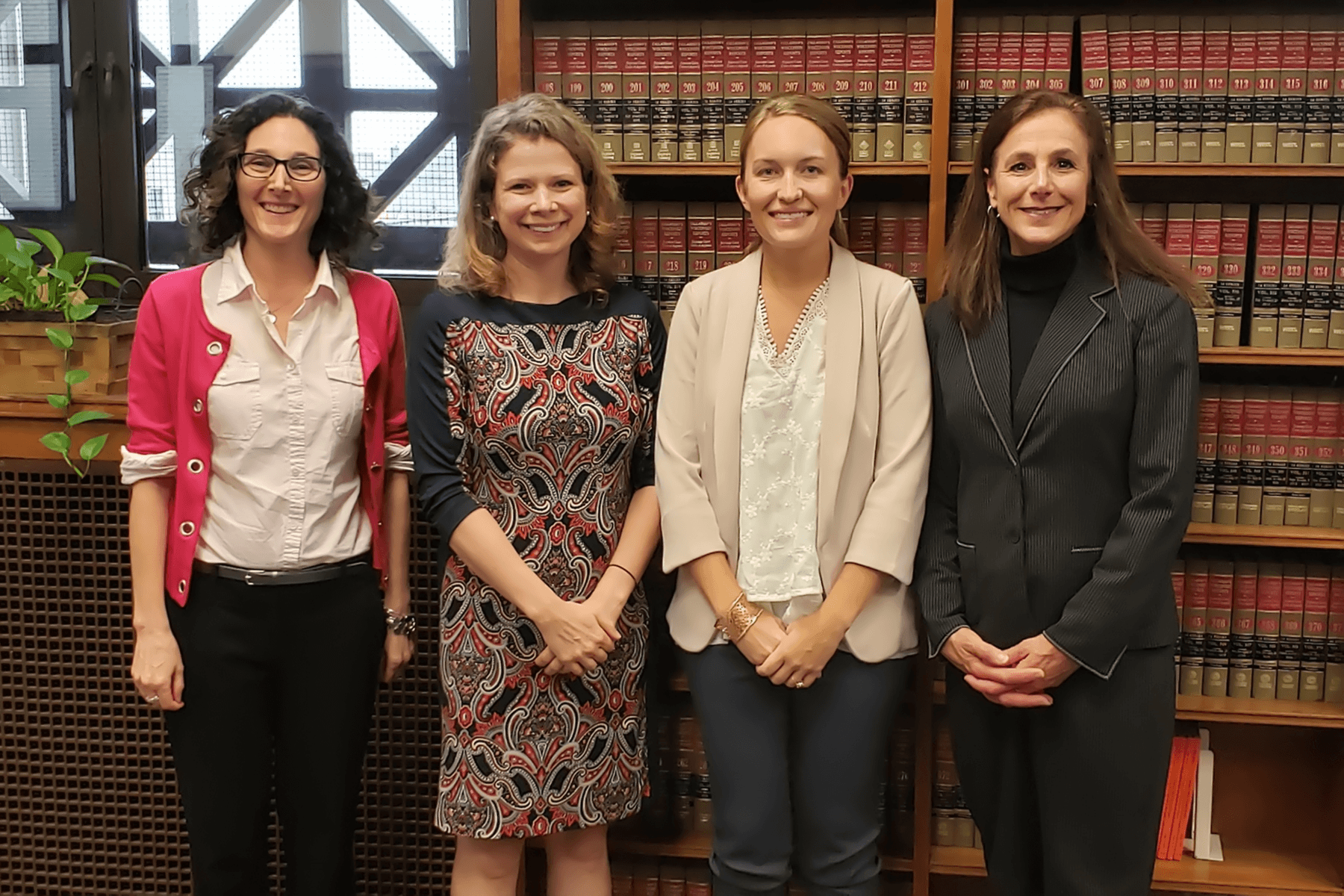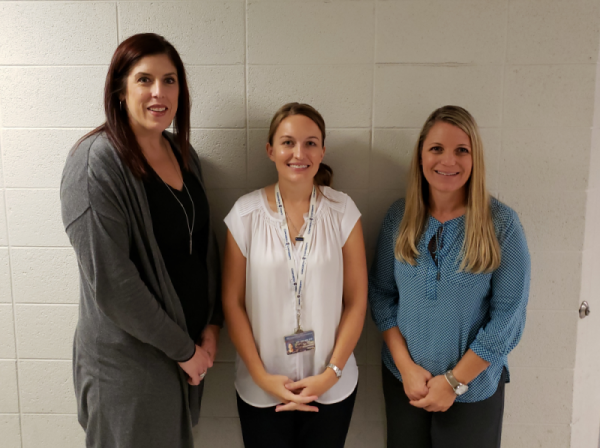 Left to right - Paige Styler, Deputy Regional Attorney Manager, State Public Defenders Office; The Honorable Cynthia Davis, Milwaukee County Circuit Court, Branch 21; Beth DeJongh, Associate Professor of Pharmacy Practice, Concordia University Wisconsin School of Pharmacy, Kelly Hedge, Assistant District Attorney
Left to right - Paige Styler, Deputy Regional Attorney Manager, State Public Defenders Office; The Honorable Cynthia Davis, Milwaukee County Circuit Court, Branch 21; Beth DeJongh, Associate Professor of Pharmacy Practice, Concordia University Wisconsin School of Pharmacy, Kelly Hedge, Assistant District Attorney I practice as a mental health clinical pharmacy specialist in outpatient mental health at the Clement J. Zablocki Veterans Affairs Medical Center in Milwaukee. I was drawn to the field of mental health because I truly enjoyed working with this patient population and found I could help fill important needs due to the shortage of psychiatric clinicians. There are several barriers to mental health care access, including but not limited to stigma, long wait times for appointments, provider insensitivity or inadequate response to mental health needs, and lack of financial resources. As a mental health pharmacist, I am able to help patients overcome some of these barriers and improve their quality of care.
The Need
Many patients also struggle with substance use disorders, which can be especially stigmatizing. Over the course of the past several years, opioid misuse and abuse has become more prevalent among my patient population. We are currently battling an opioid crisis and I found a couple of unique ways to contribute my skills to groups or organizations already working on potential solutions.
Working with First Responders
My father is a retired police officer and I recognized there are often gaps between law enforcement and healthcare. These gaps appear even wider when working with patients who suffer from mental health disorders, including substance use. Law enforcement officers are often dealing with emergent and difficult situations. They do not always get to hear the success stories about people who quit using substances and turn their lives around. Therefore, it was important to me to work with law enforcement and officers of the court on bridging these gaps.
Crisis Intervention Team (CIT) trainings are designed for law enforcement officers with a goal of improving police interactions with people living with mental illnesses and safety outcomes. CIT programs involve partnerships between law enforcement, mental health providers, and local National Alliance on Mental Illness (NAMI) chapters. Over 40 hours of training is provided in each session and I deliver one hour of that training on psychotropic medications and naloxone in Ozaukee and Washington Counties. I started participating in these trainings in 2016 and have now worked with hundreds of police officers.
 Left to right – Sergeant Lindsay Graycarek, City of Mequon Police Department; Beth DeJongh, Associate Professor of Pharmacy Practice, Concordia University Wisconsin School of Pharmacy; Captain Christy Knowles, Ozaukee County Sheriff’s Office
Left to right – Sergeant Lindsay Graycarek, City of Mequon Police Department; Beth DeJongh, Associate Professor of Pharmacy Practice, Concordia University Wisconsin School of Pharmacy; Captain Christy Knowles, Ozaukee County Sheriff’s Office
Naloxone is a potentially life-saving medication that can be administered to people who accidentally or intentionally overdose on opioids. Naloxone has also been used in the field to save police officers who accidentally ingest dangerous substances, like fentanyl or carfentanil, via inhalation or touch when responding to calls where these substances are involved. Opioids bind to receptors in the brain and an individual’s breathing can slow down and then stop if too many of those receptors become occupied. Naloxone knocks opioids off receptors in the brain, reversing the overdose and allowing the person to breathe normally again.
Many police officers in the state of Wisconsin now carry naloxone so they can administer it in emergency situations where opioid overdose is suspected. I provide training on how naloxone works, when it should be given, dosing, potential adverse effects, and storage considerations. I also include education on substance use as a disease state and viewing the person as a whole.
My goal is to provide a more humanistic perspective and reminder that all of these individuals have friends and family members who love them. As a healthcare provider, I get to hear how grateful patients and their family members are for the officers who save them. I hope sharing success stories with police officers is rewarding for them, especially when these individuals are in recovery and leading happy and productive lives.
Helping those in need: Working with the Mental Health Court
I also participate in the Milwaukee County Mental Health Court, which consists of an interdisciplinary team of lawyers, a judge, case managers, probation officers, peer support specialists, county housing representatives, medical anthropologists, a psychologist, and a psychiatrist. The team works together to help keep low-level offenders with mental health disorders out of the correctional system and to instead focus on treatment. Many of the clients in mental health court also have substance use disorders.
My role as the mental health pharmacist is to provide education to the team and the clients on the dangers associated with using some of these illicit substances. Depending on the client, education may also be provided on smoking cessation, sleep hygiene, and psychotropic medications. I review each client’s medication list and help identify potential drug therapy problems. Concerns are then relayed to the team and/or the client’s psychiatrist.
Participation in the mental health court is extremely rewarding because I get to work toward a common goal with a talented team of individuals who are not traditionally used to working together. Many of our clients are able to quit using illicit substances and obtain more optimal mental health treatment because of the services offered or recommended by the court team.
My goal is to provide a more humanistic perspective and reminder that all of these individuals have friends and family members who love them. As a healthcare provider, I get to hear how grateful patients and their family members are for the officers who save them. —Beth DeJongh, PharmD, BCPS, BCPP, associate professor of pharmacy practice
Building a better future
My work with CIT and the mental health court helps inform my teaching by giving me a better sense of the many issues facing those who struggle with substance use and mental health disorders. I also have a stronger appreciation for the work done by law enforcement officers and officers of the court and am able to incorporate some of their perspectives into patient cases for applied learning in the classroom.
My goal is for all Concordia University Wisconsin School of Pharmacy students to leave our program with a strong foundation in recognition and treatment of substance use and mental health disorders. Equally important, I hope they leave our program understanding that substance use disorders are a true disease state and the people who suffer from these disorders are deserving of our time, compassion, and empathy.
—Beth DeJongh, PharmD, BCPS, BCPP
Associate Professor, Pharmacy Practice
—
If this story has inspired you, why not explore how you can help further Concordia's mission through giving.